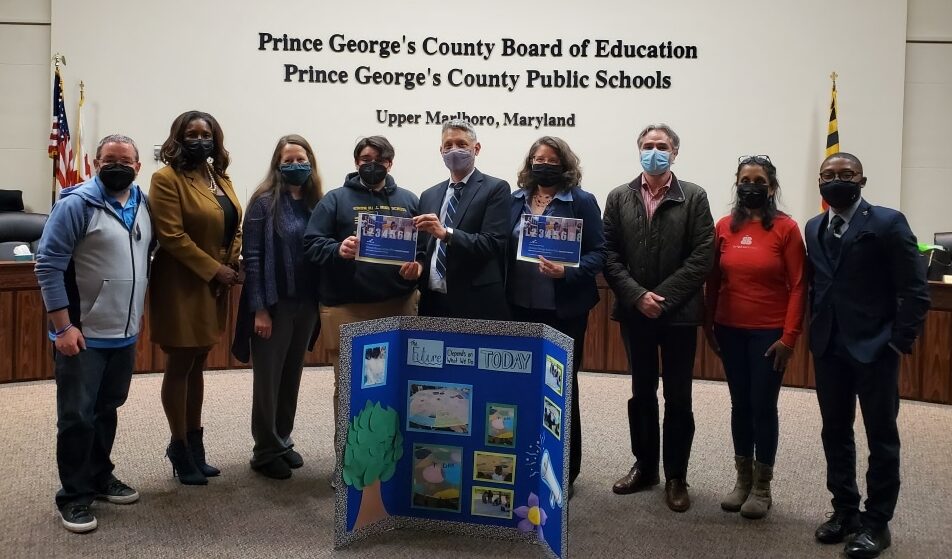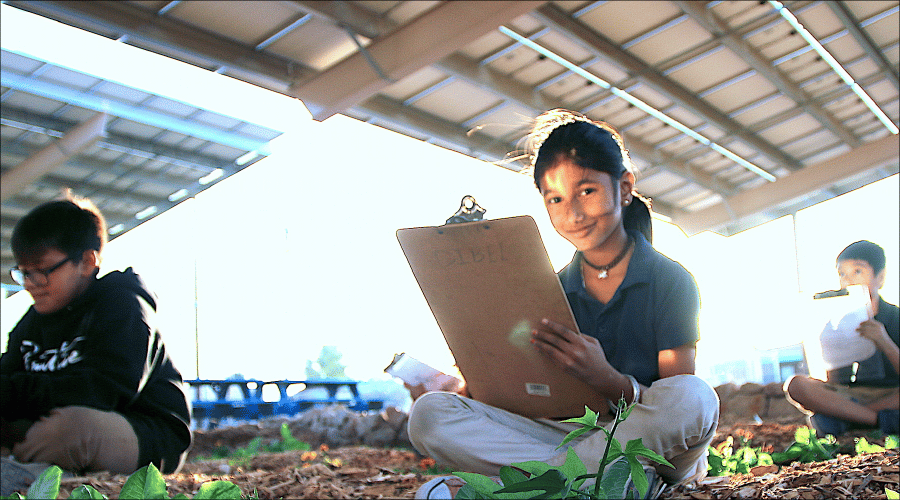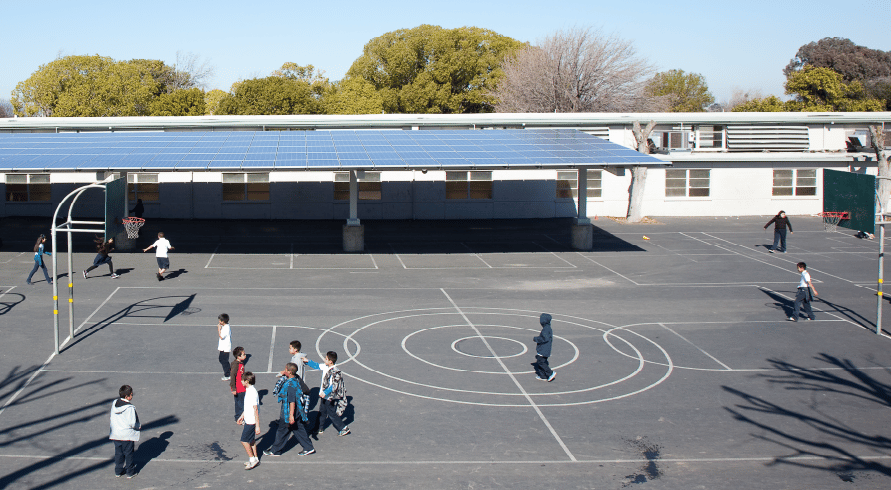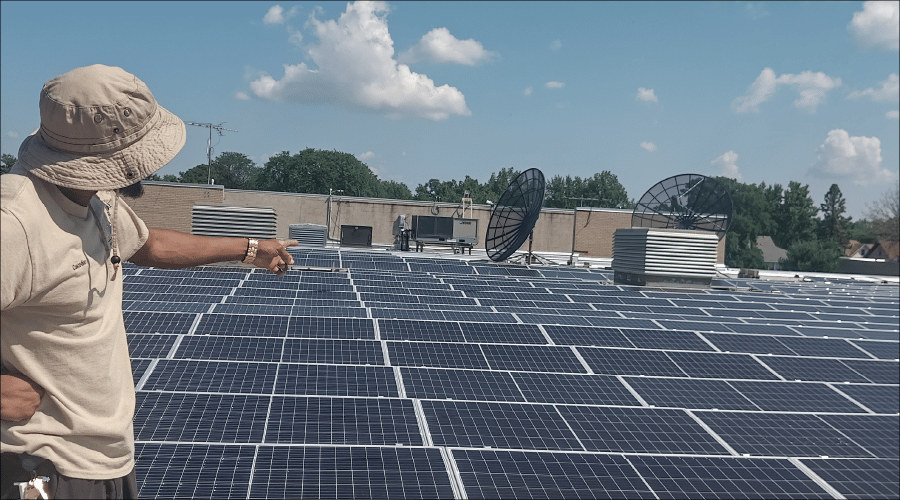In Prince George’s County, Maryland, students, parents, teachers, school officials, and local government leaders came together to commit to a bold goal of carbon neutrality by 2040 and to make a plan for climate action throughout the community. In 2021, Prince George’s County Public Schools (PGCPS) became the first school district in the state to commit to 100% clean energy. The next year PCGPS established the first school district Climate Change Action Plan (CCAP) in Maryland. The action plan was the result of several years of advocacy by students, parents, and community members and collaboration with local leaders in Prince George’s County. Together, the community achieved a milestone that is having a ripple effect throughout the school district and influencing other communities across the state.
Community calls for bold climate commitments
Pamela Boozer-Strother, member of PGCPS Board of Education, played an important role in leading the school community through the climate action process. She saw that taking climate action would address intersectional issues and provide solutions for a range of community concerns. The planned climate solutions are not only expected to save energy and avoid carbon emissions, they will also save money and improve the health of the students and staff inside the school buildings.
“We began to see a pattern that the systemic requests for change could all link to climate action—from lack of healthy fresh food options, to flooded playgrounds and athletic fields, to lack of composting and the food waste in dumpsters attracting rats,” said board member and work group co-chair Pamela Boozer-Strother. “We realized that we needed to address all aspects of climate change, and we wanted to provide pathways for increased student action and coursework.”
With broad support from the community, the Board of Education unanimously passed a resolution in March 2021 committing the school district’s transition to 100 percent clean-sourced electricity by 2030 and to 100% clean-powered transportation by 2040. PCGPS made history as the first district in the state to make a commitment to carbon neutrality that aligns with the greenhouse gas emission reduction targets outlined by the Intergovernmental Panel on Climate Change. As the second largest district in the state, the scale of the commitment is also significant. The district ranks among the 20 largest school systems in the nation with nearly 132,000 students, 22,000 employees, more than 200 schools and centers, and more than 1,200 buses.

Including diverse perspectives in the climate action plan
After the resolution was passed, the district formed a Focus Work Group to draft the Climate Change Action Plan (CCAP). According to Joseph Jakuta, a PGCPS parent and and co-chair of the CCAP Focus Work Group, “it was important to establish the CCAP so that there would be a solid roadmap in place that staff could use to make climate-friendly decisions and that the Board of Education, as well as the community at large, could follow to ensure that climate action was happening.”
The Focus Work Group was formed with a goal of including the voices of the diverse stakeholders engaged with and affected by the Climate Change Action Plan. As the co-chair of the work group, Jakuta wanted to ensure that more ideas were brought to the table, that underrepresented groups had their views included, and that more stakeholders had buy-in for the successful implementation of the plan. The work group pushed the importance of embedding environmental justice, labor considerations, and student voices into the plan, rather than making these issues afterthoughts. As the plan was being developed, the work group engaged with PGCPS students, alumni, staff, parents, labor partners, environmental justice advocates, community organizations, and elected officials.
According to Boozer-Strother, “we wanted to establish students as the leaders of the plan so that we could reduce climate anxiety through action and multigenerational partnerships.” To facilitate that ownership, the group held events for student leaders to communicate the plan and get feedback and ideas from other students.
We wanted to establish students as the leaders of the plan so that we could reduce climate anxiety through action and multigenerational partnerships. – Pamela Boozer-Strother, PGCPS Board of Education
Collaborating with local government and other school districts
During the development of its climate action plan, PGCPS made sure to consider how they would interact with their local government partners and other school districts throughout the state.
While Prince George’s County Public Schools was working on developing their action plan, it learned that the county government was concurrently taking steps toward its own climate action plan, mandated by a 2020 resolution. PGCPS adapted the timeline to develop its own plan in order to facilitate collaboration between the school district and county work groups and to make sure the two plans were cohesive. The school district and county voted to adopt their aligned climate action plans within months of each other in 2022.
In addition, the district wrote into the plan that it wanted to lead by example and that it would share lessons learned with other school districts. Boozer-Strother led a resolution for climate action at the Maryland Association of Boards of Education (MABE). She helped Maryland make history by leading MABE to become the one of the first statewide associations of public school boards to declare climate action as an essential component of adequate and equitable school facilities. Boozer-Strother has advised other Maryland school districts, including Howard County, Frederick County, Montgomery County, Anne Arundel, Baltimore City, and Baltimore County, on their own plans for climate change action.
Making progress towards climate goals
PGCPS is making progress toward the goals in their plan. In October 2023, the district hired a director of sustainability and resilience, Dorothy Morrison, to lead plan implementation and monitoring. The district acquired 21 electric school buses, with one already in service and the remaining 20 to be on the road during the 2024-2025 school year. PGCPS received a grant from the Maryland Energy Administration Decarbonizing Public Schools Program to improve data collection and analysis of its building energy performance. Solar energy systems have been installed at four schools, and any new school buildings will be designed to be solar-ready. Fifteen school buildings have installed ground-source heat pumps.
“All of these changes are just the start of a long-term commitment to sustainability in the county,” Jakuta said. “The Climate Change Action Plan has shown that Prince George’s County is serious about our children’s futures and is a real leader in the state of Maryland.”
In August 2024, Prince George’s County Public Schools was awarded $3.5 million from the Maryland Energy Administration’s Decarbonizing Public Schools program to increase energy efficiency at Calverton Elementary School and design and construct geothermal HVAC systems to achieve net zero energy at three elementary schools. According to Dr. Charoscar Coleman, PGCPS Chief Operating Officer, these grant funds allow the district to ‘swiftly implement recommendations from our Climate Change Action Plan, [which] guides our efforts to reduce our carbon footprint, improve energy efficiency, and foster a culture of environmental stewardship.’
PGCPS Climate Action Timeline
- 2019 – Community partners, including Sierra Club’s Climate Parents and the League of Conservation Voters’ Chispa, begin pressuring PGCPS to move toward clean energy, electric school buses, and better waste management.
- February 2020 – In the last budget meeting before the onset of the COVID-19 pandemic, school board members recommended a holistic approach to develop a plan to meet community member climate goals.
- Spring 2020–Spring 2022 – Prince George’s County passes council resolution mandating a climate action. PGCPS later collaborates with the county working group to align the goals and action plan.
- March 2021 – After a pandemic-driven delay of several months, PGCPS works toward and passes a resolution that establishes both climate goals and the Climate Change Action Plan (CCAP) Focus Work Group to develop a plan for meeting the goals.
- January 2022 – Climate Action Plan Focus Work Group completes work on the CCAP and shares the plan with standing committees on Academics, Operations/Budget & Policy.
- April 2022 – PGCPS Board of Education adopts the plan with unanimous consent.















